In
Blog 2023
(an interview conducted by Nikolai Brandes and Anna Sophia Nübling of gd:c)
Encouraging dialogue between the arts and the humanities is one of the principal goals of
global dis:connect, so we asked two of our fellows about their experiences and what they would like to see at an institution like gd:c. We wanted to know what they think about this relationship in light of their current projects and to what extent this relationship is relevant to their work.
Ayse Güngör is a curator and art historian with a background in art theory, anthropology and curation. She researches the confluence of art and anthropology in the work of contemporary Turkish artists, broadening narratives of global art, cultural exchange and eco-art practices. She investigates theories of artistic representation and institutional frameworks.
Enis Maci studied sociology and creative writing. She is the author of an anthology,
Eiscafé Europa (Suhrkamp 2018), and a number of plays, including
WUNDER (Suhrkamp 2021). She has (co-)edited
A Fascinating Plan (Spector 2021) and
Filamentous Magic Carpets (März 2022). Most recently, her play
LORBEER premiered at Schauspiel Stuttgart.
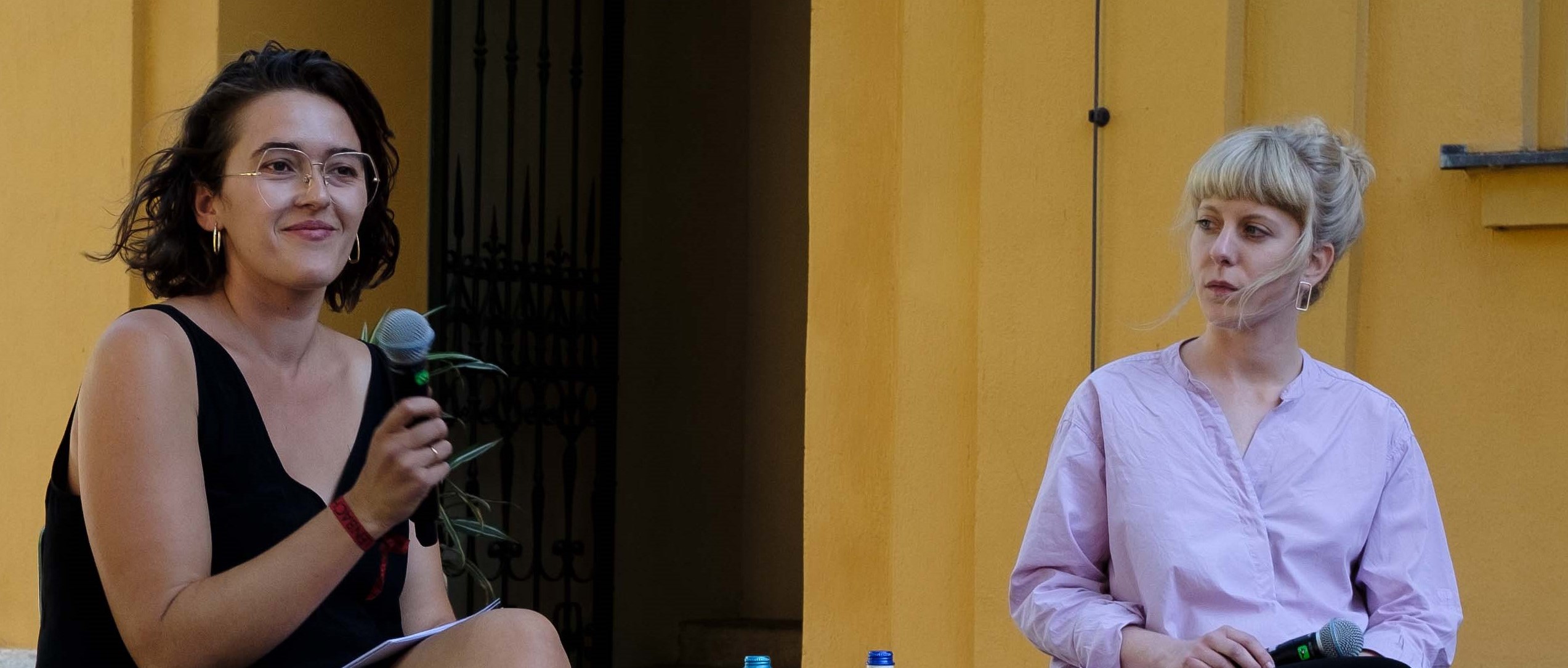
Enis Maci and Anna Nübling (right) discussing Filamentous Magic Carpets at the Lenbachhaus, August 2022 (Photo: Luzia Huber)
To start, could you both tell us a bit about what you're currently working on? And given the subject of this conversation, we are especially interested in how you, as an author-playwright and curator, approach your topics considering that you both keep one foot in academia.
EM: My current project started from a piece of pop culture: the early 90s high-school sci-fi movie
Habitat, which is set in a near future where the ozone layer is irreversibly damaged. Earth has become extremely hot, and people mostly go out at night. The teenage protagonist, who has all kinds of teenager problems, is the son of two rogue scientists who have stolen an inexplicable, gnostic, slimy life form from a government lab. It escapes from its container and kind of eats or absorbs the father. However, this artificial life form is then somehow supposed to save the irreversibly doomed Earth.
These themes lead to questions about multiplicity, about what life is exactly and what cooperation and interconnectedness could mean. And then, on another level, the teenage protagonist finds out that his parents have genetically engineered him to dampen the high temperatures. He thinks that's terrible and kind of embarrassing, but it turns out to be a superpower. Watching the movie today shows how the near future was imagined not too far in the past, while some of the parameters of this dystopic vision have vanished simply because there is not really a hole in the ozone anymore.
The mysterious life form — the gnostic slime — interested me greatly. Something communal, but not collective. One cell with many nuclei, maybe. I explored that in an event at Lenbachhaus
[1] and an accompanying anthology under the title
Filamentous Magic Carpets (März, 2022). It turned out that the Lenbachhaus was planning an exhibition on Rosemarie Meyer, an American feminist artist of the 1970s who worked mostly in textiles. Rosemary’s work often dealt with unexpected connections between points in space and between materials. Loose threads everywhere.
Her sister, Bernadette Meyer, is a poet. I’ve always loved her work. So, l turned to her book
Utopia. Here, again, questions of communality, of a better future and the everyday life surrounding it. In
Utopia, there is a chapter titled
Filamentous Magic Carpets, where everything comes together. And then I invited five writers and two scholars to think about these things and write about them. It was an experiment and, eerily, their different ways of thinking did in fact intertwine into a slimy sort of tapestry.
AN: As I was one of the two scholars you invited to think and about those things, I might add that it was fruitful to approach the topic as you suggested. To think with those ‘loose threads’ and to see what they unravelled. But let’s turn to Ayşe: what can you to tell us about your current project?

Ayşe Güngör
My project is about a series of exhibitions on representations of Istanbul in Germany since 2000. By exploring this as a complex relationship of global interconnectivity, I identify gaps and limitations in the globalisation of contemporary Turkish art by considering art and cultural politics in Europe. These exhibitions featured Turkish artists entangled in representational forms of the international art scene’s global agenda. Exhibitions of ‘Turkish art’ in Germany were often supported by big institutions that supported cultural exchange following Turkey’s application for EU membership. I focus on the ideas of connectedness and disconnectedness that evolved around those exhibitions, considering exhibition strategies and artistic forms of resistance. The goal is to decolonise the globalisation of contemporary Turkish art. I ask how we can represent without reductively constructing, defining, restricting, disintegrating or silencing artists’ autonomy.
EM: If this is about being a Turkish artist in a global space, or maybe just outside the country, what is ‘being Turkish’? How can people be Turkish apart from citizenship?
AG: I think the designation ‘Turkish’ allows outsiders to starkly limit who counts as ‘Turkish’. Everything was being related to Turkey in very restricted ways that didn’t acknowledge many identities.
EM: That’s why I'm asking — people could relate to Turkey because they have lived there or they have citizenship, but still refuse the notion of being Turkish, which is a highly political question.
AG: Definitely. But cultural identity is often instrumentalised while cultural diversity is supposedly celebrated. Turkish artists were also stereotyped in Germany. That was part of the cultural strategies that always relate to identity. I would love a term that denoted ‘from Turkey’ without implying ‘Turkish’. But I am also interested in how several exhibitions instrumentalised ‘Turkishness’ as a tool of cultural politics.
AN: Returning to the matter at hand, do you consider artistic practice a process of cognition and knowledge production? It might, for example, offer freedoms denied to scholarship. And to what extent is what we learn from art different from what we learn from research?
EM: I don’t think writing yields cognition or insight. The poetry of my work has a lot to do with finding something out. It is about having a hunch and trying to get to the bottom of it, or maybe having an itch, but not knowing where to scratch. So writing would be getting to the bottom of the hunch. Or maybe it’s as if I were trying to write directions to my itch. A lot is about
finding out, like a detective or a scientist, maybe a mad scientist. And then I also think in terms of method, research, however you frame it, which is often finding the truth in something as much as discovering something useful. In my first book, for example, there's one essay on the identitarian movement. Not until I started compiling my artistic research did a realise that I had this huge database, which led me to write my master's thesis about them. So, the question of knowledge production kind of started with literature and evolved into scholarship.
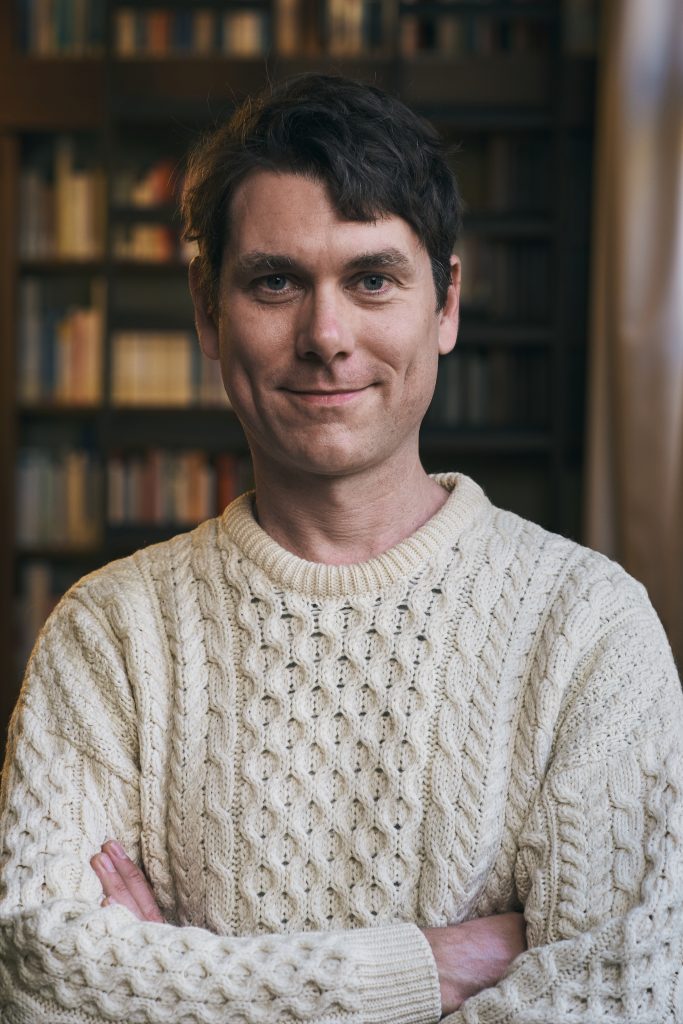
Nikolai Brandes (Photo by Lamber Strehlke, strehlke@gmail.com)
I like the idea that the starting point is the itch…
EM: Isn’t that the case for you too? You go into the office, it's a nice day in Munich, you drink your coffee, you do some paperwork, things that need to be done, but then there’s something else, right? There is this one thing you need to find out about. Or maybe some asshole wrote an article, and he was like 80% correct, but 20% of it was wrong. You are so sure of that, so you need to, you know, understand it, prove it, get the truth out there.
NB: Could you expand on switching between working artistically and academically?
EM: The question is whether there are even two modes of working? Both methods have their limitations. In academia we are committed to objectifiable truths. But literary writing also seeks truths that need to be protected, truths in the slipstream of objectifiable truth. Both these commitments, in literature and in scholarship, come with certain ethics. But in the end, for my work at least, the distinction boils down to something esoteric, something small that resists enclosure. It’s even more blatant in the visual arts, because they resist the logic of language-based narration.
AN: You described the process of digesting material. You leave things out, you add things, you have something in the ‘slipstream’ of the objectifiable …
EM: You try to produce conclusions that are kind of necessary. But I don't think they would always meet the criteria of a necessary conclusion in the academic world. But there is a necessity to them somehow. It always depends on the work at hand. It always depends on what you're trying to find out and where the itch is or what the hunch was …
NB: Ayse, maybe you could also expand on how you combine your research and curation. Is curating just another form of scholarship?
AG: There is a negative impression that science always needs to keep a distance from society to remain objective. And today, artists are becoming more engaged with society as a research topic, which shows how research and art are joining forces. As Enis mentioned, she also digests material in many different ways. From my point of view, working as a curator and as a social scientist, artistic and scholarly approaches complement each other. In curation, research results might appear directly when organising an exhibition, which goes far quicker than research. Research and artistic practices cannot be distinguished from one another anymore. Therefore, I think in terms of ‘knowledge-making’, which we need to integrate into the social sciences. They need to be ‘flatter’ in engaging with arts.
NB: Artistic thinking as a means of producing knowledge has become a very popular topic recently. It's a popular topic in art history and in curation too. If your own approach to art and artistic thinking is a means of knowledge production, can you think of any role models? Enis, have any writers inspired your way of learning through creative writing? You said that you sometimes find fine arts more interesting than literature because of what you called the visual arts’ ‘resistance towards language-based narration’. Are there any artists that you find particularly interesting?
EM: That’s very difficult to answer. Artistic learning, maybe academic learning and maybe everyday learning (like you shouldn't touch the hot stove and such) don't really seem separate to me. I think the separation happens in methods and in the mutually agreed limitations of speech, maybe. So, I’m interested in finding out where these limitations lie and making that fertile for my work. I’m more interested in finding out how other people find things out and how that relates to me. But that, of course, is a sort writing that is very research based, that is kind of essayistic. Maybe you would find very different answers if you talked to novelists, which also requires research that is similar but not identical to the research my writing is based on.
NB: I asked that question because when I began my current research — the architectural history of modernism in Africa — I first looked into the literature on the topic, which was interesting. But then I found a photo book by Guy Tillim, a South African photographer. He took pictures of late-colonial and early post-colonial architecture in southern Africa. Those pictures said so much. I felt there was not much to add academically. I had the feeling that everything was already there in the pictures.
EM: That’s so interesting because if I saw that myself, as a writer, I would be like, ‘Okay, there is nothing to add; good luck to you; you did it’. But some things don’t ‘exist’ until you’ve researched them. Academia is oblivious to them. And you as an academic want to change that. I mean, this architecture exists to the people who live there, who see it every day, and to the people who built it, and to the people who know these photographs. But it does not exist to academics. So basically, you bring something that already exists into existence for other people. And that is an undertaking that goes beyond getting to objective truth. So, you were on a different kind of mission, which I find extremely interesting.
AN: Ayse, do you feel the same? That you can't really answer whether there are any role models for your curation?
AG: Not for curation, but I can think of role models for my research. My work focuses on the confluence of art and anthropology. I'm really influenced by the way Tim Ingold thinks in terms of the integration of anthropology, archaeology, art and architecture, by the way he thinks of ‘Making’ as transformative knowledge production, and how he advocates practicing inquiry rather than the conventional practice of ethnography, the way he argues that conventional ethnography does not lead anywhere.
AN: Maybe you could say what you would expect from
global dis:connect in the future? How can
global dis:connect provide an environment for interdisciplinary cooperation?
AG: You are already. I’d like a bit more collaboration with artists, because, ‘science’ has a bad reputation, it’s loaded with objectivity, which distances academia from other forms of research. So more artistic engagement could expand our understanding of academic research. Artistic research, visual representations and experimental practices could supplement text-based academic research.
NB: But how do we avoid including artists as mere ornaments in projects like
global dis:connect? You know, scholars doing the ‘serious’ stuff, and then including some artists who kind of illustrate the academics’ findings.
EM: I didn’t feel like an ornament. Maybe because I don’t really regard my own research as substantially different from academic research. I expected exchange between fellows, I expected to connect with the city at large. And I am happy to report that both those things happened. So that's nice. I’m curious to see where I stand with this work after my fellowship. Will it feel like a wrap or will it lead to more questions? We will see!
[1] Maci’s event "Filamentous Magic Carpets" took place at the Lenbachhaus on 14 August 2022 and included readings, talks, a concert, a film and the launch of the book of the same title, see: https://www.globaldisconnect.org/10/18/ruminating-on-a-hunch-at-filamentous-magic-carpets/.
Continue Reading
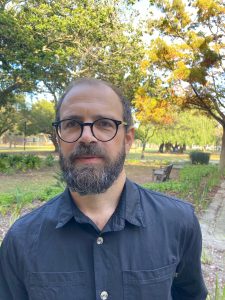 A warm welcome to our new guest Ross Truscott who joins global dis:connect in early June.
A warm welcome to our new guest Ross Truscott who joins global dis:connect in early June.





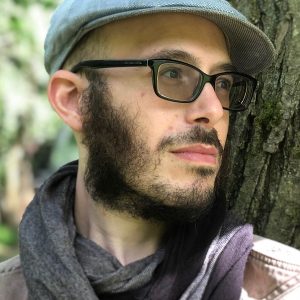 In April, historian Roii Ball commenced his term as a fellow at global dis:connect. Welcome, Roii!
Roii Ball is a social historian of nineteenth and twentieth-century Germany and Central Europe and their colonial entanglements. He is a postdoctoral lead researcher at the Religion and Politics Cluster of Excellence at the University of Münster. Ball earned his PhD from the University of California, Los Angeles in 2021 with a dissertation on the social dynamics and bureaucratic practices of German colonisation in the Polish provinces of Prussia before WWI (Advisor: David Sabean).
Ball’s work focuses on family and kinship to explore histories of colonisation and their intersection with empire-making and nation-making. His research interests include the history of knowledge, history of childhood, environmental history, and digital history. He has held fellowships at the University of Cologne, the German Historical Institute in Warsaw, and the Leibnitz Institute for European History in Mainz. During 2023 and 2024, he will also be a visiting research fellow at global dis:connect.
In April, historian Roii Ball commenced his term as a fellow at global dis:connect. Welcome, Roii!
Roii Ball is a social historian of nineteenth and twentieth-century Germany and Central Europe and their colonial entanglements. He is a postdoctoral lead researcher at the Religion and Politics Cluster of Excellence at the University of Münster. Ball earned his PhD from the University of California, Los Angeles in 2021 with a dissertation on the social dynamics and bureaucratic practices of German colonisation in the Polish provinces of Prussia before WWI (Advisor: David Sabean).
Ball’s work focuses on family and kinship to explore histories of colonisation and their intersection with empire-making and nation-making. His research interests include the history of knowledge, history of childhood, environmental history, and digital history. He has held fellowships at the University of Cologne, the German Historical Institute in Warsaw, and the Leibnitz Institute for European History in Mainz. During 2023 and 2024, he will also be a visiting research fellow at global dis:connect. 


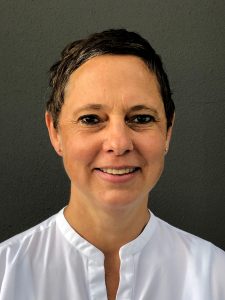 A warm welcome to our new guest Cathrine Bublatzky who joins global dis:connect in early April.
Cathrine Bublatzky is a media anthropologist and senior lecturer at the University of Tübingen.
She was formerly assistant professor at the Heidelberg Centre for Transcultural Studies.
She researches diaspora and exile, archives, visual and digital media cultures, photography, art, activism, and the aesthetics and politics of belonging throughout Europe, South Asia and the Middle East.
Cathrine has been speaker of the DFG Network Entangled Histories of Art and Migration: Forms, Visibilities, Agents (2018–2022) and author of Along the Indian Highway: An Ethnography of an International Travelling Exhibition, a monograph published by Routledge.
Her project Contemporary Photography as Cultural Praxis of Iranians in the European Diaspora, which she will continue at global dis:connect, was awarded a scholarship by the Baden-Württemberg Foundation.
A warm welcome to our new guest Cathrine Bublatzky who joins global dis:connect in early April.
Cathrine Bublatzky is a media anthropologist and senior lecturer at the University of Tübingen.
She was formerly assistant professor at the Heidelberg Centre for Transcultural Studies.
She researches diaspora and exile, archives, visual and digital media cultures, photography, art, activism, and the aesthetics and politics of belonging throughout Europe, South Asia and the Middle East.
Cathrine has been speaker of the DFG Network Entangled Histories of Art and Migration: Forms, Visibilities, Agents (2018–2022) and author of Along the Indian Highway: An Ethnography of an International Travelling Exhibition, a monograph published by Routledge.
Her project Contemporary Photography as Cultural Praxis of Iranians in the European Diaspora, which she will continue at global dis:connect, was awarded a scholarship by the Baden-Württemberg Foundation.
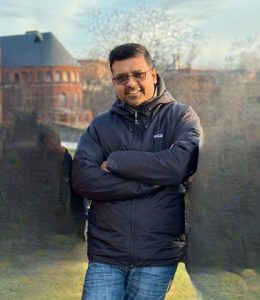 A warm welcome to our new guest Arnab Dey who joins global dis:connect in early February.
Currently an associate professor of history at the State University of New York at Binghamton, Arnab is a historian of modern India and the British Empire, with research interests centred around questions of law, labour and the environment. Arnab’s first monograph, Tea Environments and Plantation Culture looked at the monoculture tea enterprise of British east India. This study brought the plant and the plantation together in analysing the praxis and politics of commodity capitalism. His associated research agendas and publications have similarly involved tracing imperial capital, legal regimes and environmental transformations in the British colonial world and the Indian subcontinent.
A warm welcome to our new guest Arnab Dey who joins global dis:connect in early February.
Currently an associate professor of history at the State University of New York at Binghamton, Arnab is a historian of modern India and the British Empire, with research interests centred around questions of law, labour and the environment. Arnab’s first monograph, Tea Environments and Plantation Culture looked at the monoculture tea enterprise of British east India. This study brought the plant and the plantation together in analysing the praxis and politics of commodity capitalism. His associated research agendas and publications have similarly involved tracing imperial capital, legal regimes and environmental transformations in the British colonial world and the Indian subcontinent. 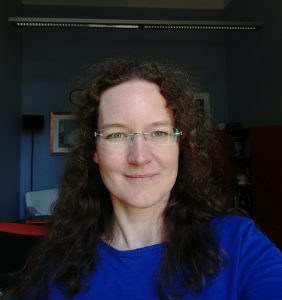 A warm welcome to our new guest Katharina Wilkens who joins global dis:connect in early February.
A warm welcome to our new guest Katharina Wilkens who joins global dis:connect in early February.

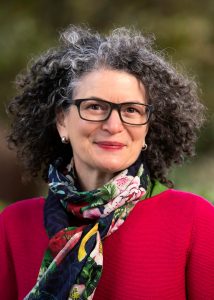
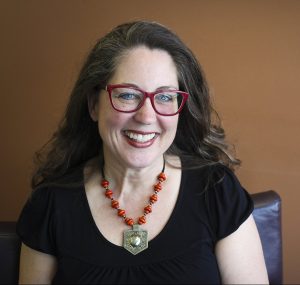
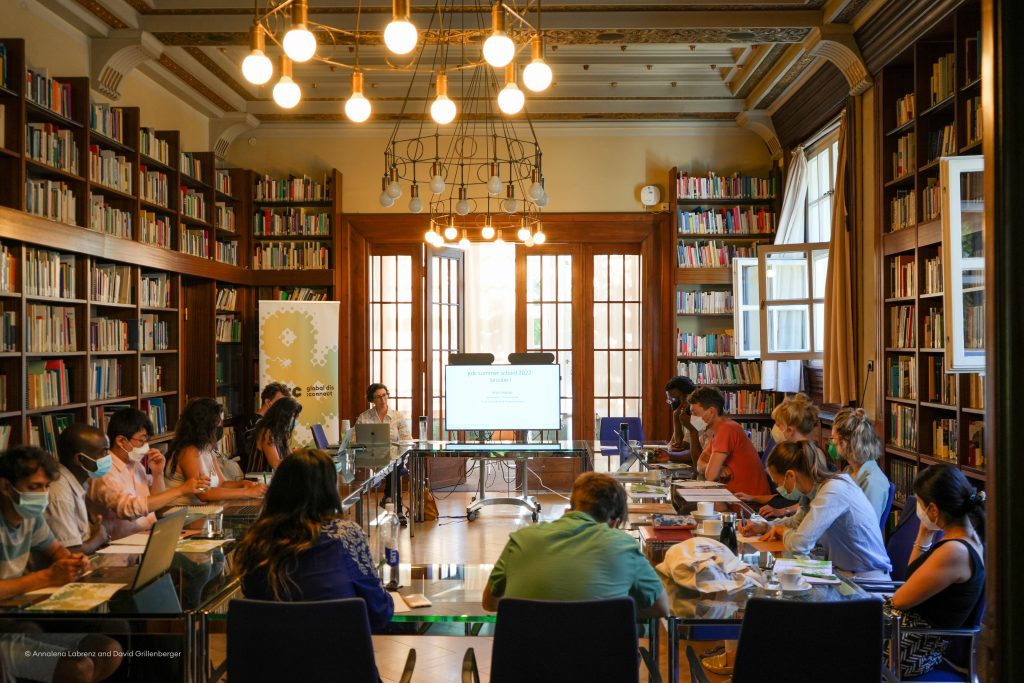 Ayala Levin's master class (Image: Annalena Labrenz & David Grillenberger)
Ayala Levin's master class (Image: Annalena Labrenz & David Grillenberger)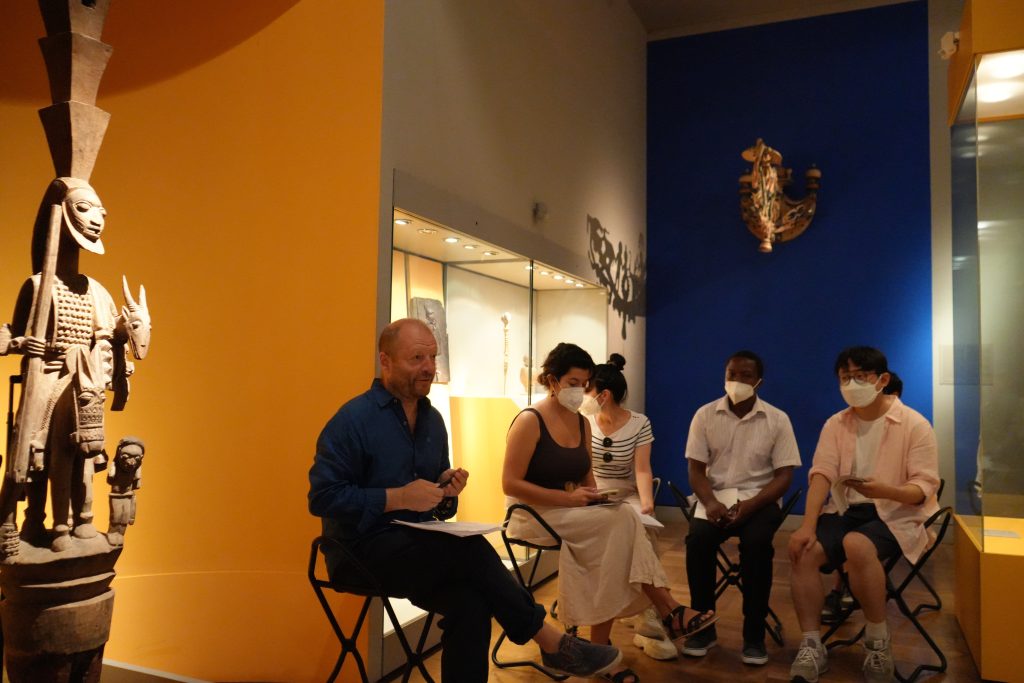 The gd:c summer school takes a field trip to the Museum Fünf Kontinente. (Image: Annalena Labrenz & David Grillenberger)
The gd:c summer school takes a field trip to the Museum Fünf Kontinente. (Image: Annalena Labrenz & David Grillenberger)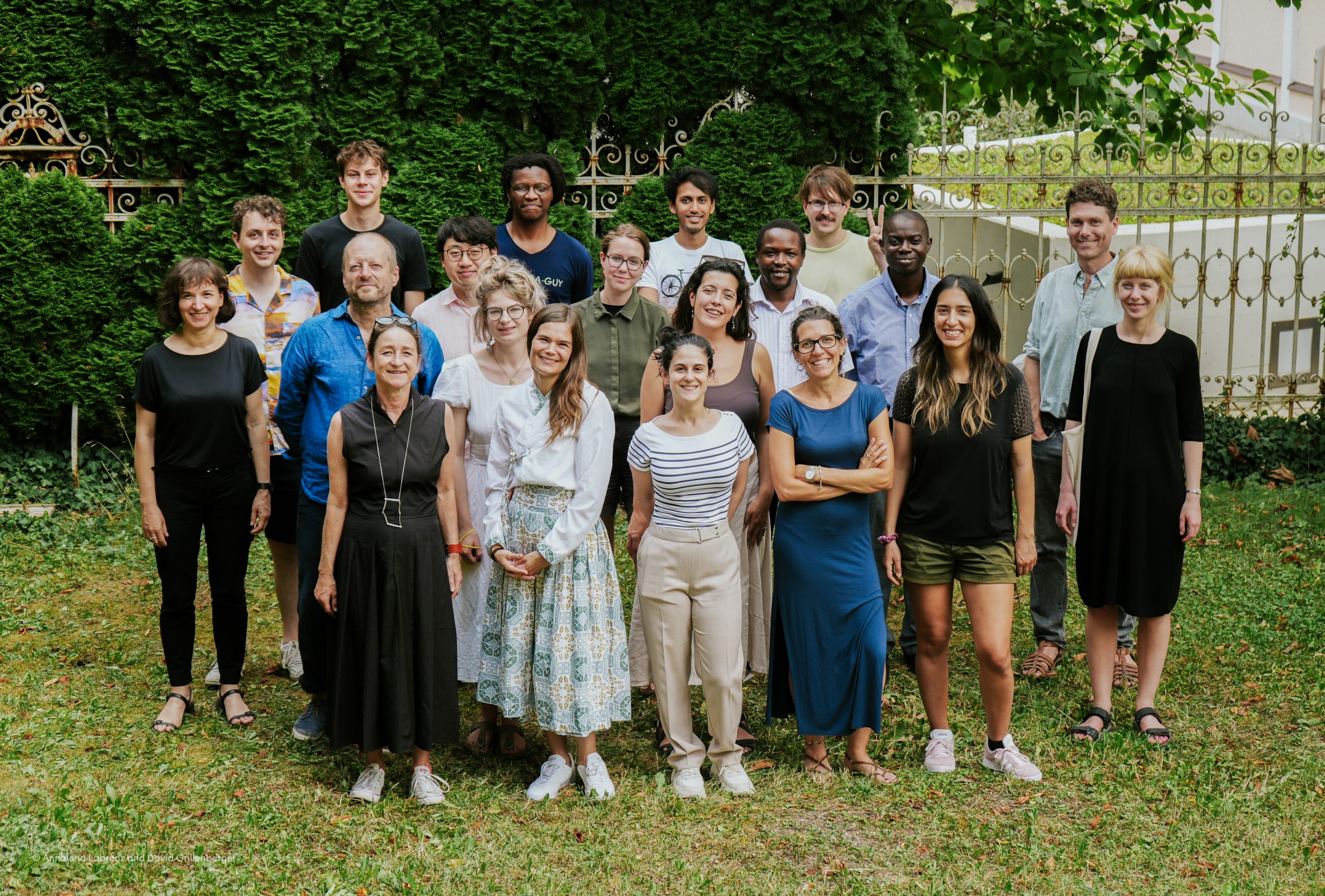 One, yet many (but not too many). (Image: Annalena Labrenz & David Grillenberger - the author in the back left with the snappy Hawaiian shirt)
One, yet many (but not too many). (Image: Annalena Labrenz & David Grillenberger - the author in the back left with the snappy Hawaiian shirt)